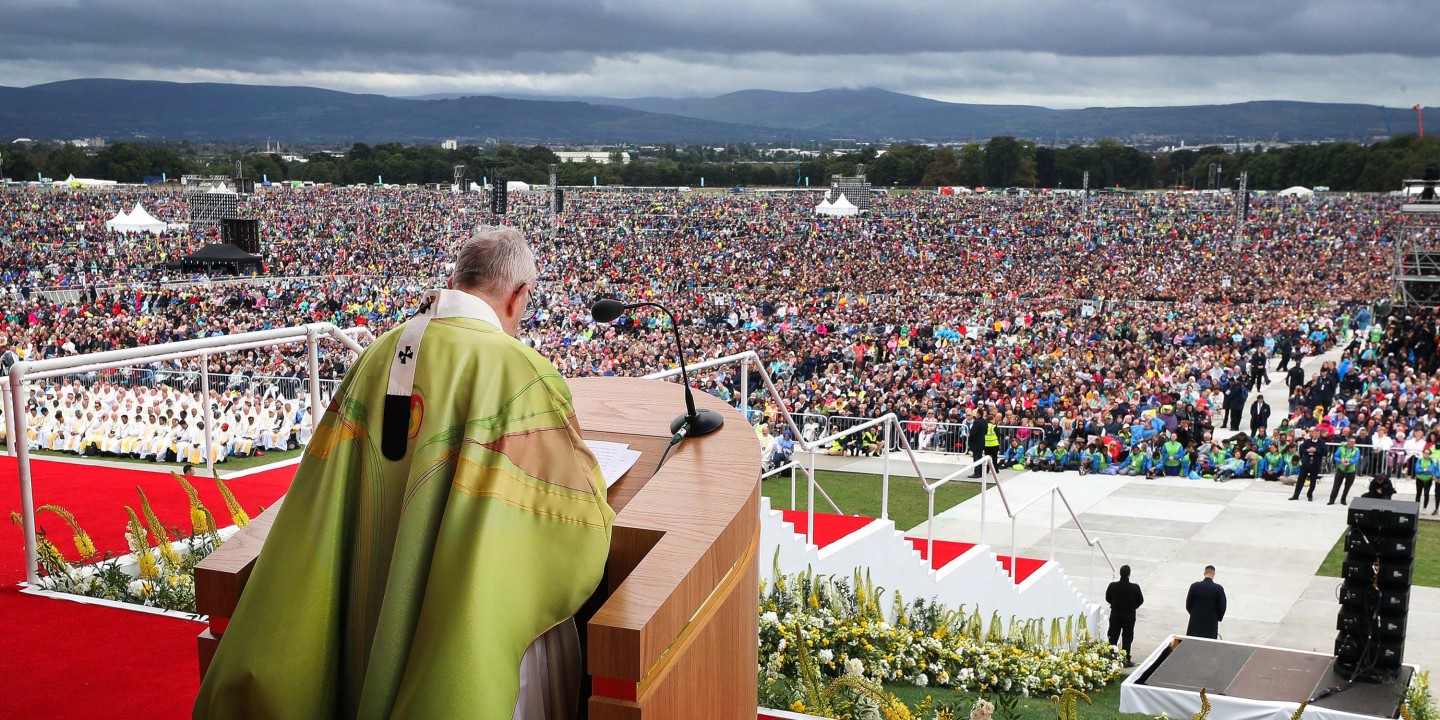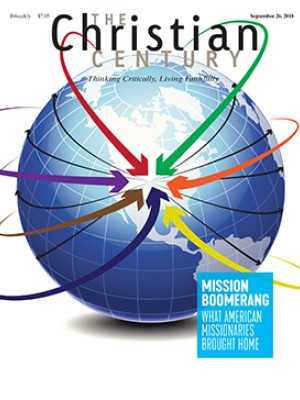In Ireland visit, Pope Francis appeals to divided Catholics and struggles with abuse fallout
During closing mass, several thousand people instead attended a “Stand4Truth” protest.

For many in Ireland, Pope Francis’s appearance at the World Meeting of Families was a historic occasion to be celebrated, even amid the latest reports of clergy sexual abuse and alleged attempts to cover them up—including charges that the pope did that himself.
Others regarded Francis’s visit as a painful reminder of the profound harm done by an institution that has deeply shaped life in the country.
In his two-day tour, the pontiff attempted to reach both of these audiences. At several stops—including a speech to government officials at Dublin Castle—he acknowledged clerical abuse in Ireland while straining to focus on the importance of family life.
Read our latest issue or browse back issues.
In his closing homily, Francis sought forgiveness for exploitation and “all the abuses committed in various types of institutions run by male or female religious and by other members of the church.” He also asked for pardon for children being separated from single mothers, for times that the church did not show compassion, and for failure in “the search for justice and truth through concrete action.”
Francis encouraged Catholics to be honest about the difficulty of following Jesus in turbulent times.
“Many of [the apostles] were upset, confused or even angry, struggling to accept his hard sayings,” he said, quoting from the Gospel of John, “so contrary to the wisdom of this world. In response, the Lord tells them directly: ‘The words I have spoken to you are spirit and life.’”
For Nick Wall, a Londoner who attended the closing mass August 26 with his wife, Susan, and their two teenage children, it’s time to forge a new church focused on supporting the faith of young people.
“We all need to acknowledge things have happened and move forward,” Wall said.
As approximately 130,000 pilgrims made their way into Phoenix Park to celebrate the closing mass with the pope, some 5,000 were estimated to have attended a Stand4Truth rally at the Garden of Remembrance.
Colm O’Gorman, an abuse survivor who organized the event, recalls being among the 300,000 in attendance at a mass in Galway during John Paul II’s visit in 1979.
“John Paul held out his arms and said, ‘Young people of Ireland, I love you,’” O’Gorman said. “I remember that moment because I believed him.”
A year and a half later, O’Gorman was raped by a Catholic priest who had been ordained despite multiple accusations against him. The priest remained in ministry for years until O’Gorman sought justice.
“Now when I think about ‘Young people of Ireland, I love you,’ I think, no, you didn’t. You did not love us,” he said. “We have discovered over the last 20 years the depth of how you did not love us.”
The Stand4Truth rally was followed by a silent procession to Gloucester Street laundry, one of Ireland’s Magdalene laundries which relegated unmarried mothers to confinement and menial labor. At the laundry, which closed in 1996, O’Gorman recalled how John Paul II rode down Gloucester Street without stopping to acknowledge the detention of women and girls there: “They weren’t allowed outside to watch him pass.”
Other significant moments of the visit included the Irish Catholic Bishops Conference announcing it would withdraw investments in 200 oil and gas companies within five years, joining 95 other Catholic organizations worldwide in committing to divestment.
“The impact in terms of human suffering to families is devastating,” the Irish bishops said in a statement August 24. “Climate change is already leading to forced migration, separation of families, and increased pressure on resources.”
Participants in the World Meeting of Families, a four-day pastoral congress, heard talks by church leaders in the United States and beyond as they sought encouragement in the wake of ongoing abuse scandals and shifting societal attitudes about sexuality.
American Jesuit priest James Martin told a standing-room-only crowd that LGBT inclusion is a “life issue” in many countries. He encouraged Catholics to be prophetic voices for those who are persecuted for their sexual orientation. In places where LGBT people are marginalized, he said, laypeople can repent on behalf of the whole church.
“If they were harmed by the church, you are a minister of the church,” Martin said. “You can apologize.”
As Pope Francis flew back to Rome, he faced reporters’ questions about a letter released August 26 by the Vatican’s former ambassador to the United States alleging that both Pope Francis and Pope Emeritus Benedict XVI were complicit in allowing Cardinal Theodore McCarrick to continue in ministry even after he had been sanctioned for having sexual contact with seminarians in his charge. In the letter, Archbishop Carlo Maria Viganò wrote that the pope should resign.
Francis refused to comment, suggesting that he would address Viganò’s allegations at a later date.
In the letter, Viganò wrote that he knew of McCarrick’s abuses beginning during the tenure of Pope John Paul II and that he informed his superiors in 2006 of accounts that McCarrick had sexually abused seminarians and priests. Though he did not cite the date, he said that “Pope Benedict had imposed on Cardinal McCarrick sanctions similar to those now imposed on him by Pope Francis.”
Viganò charges that Francis removed those constraints in 2013, allowing McCarrick to travel and lecture freely.
After he released the letter, Viganò’s own credibility came into question because of charges that in 2014 Viganò himself, as nuncio, put a stop to the investigation of then archbishop of St. Paul and Minneapolis John Nienstedt, who had been credibly accused of sexual abuse. Viganò called the accusations false in a statement also released on August 26. —Religion News Service; additional information
A version of this article, which was edited September 6, appears in the print edition under the title “Pope Francis struggles with abuse fallout.’”





